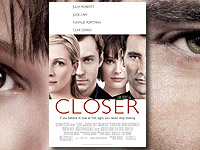Brokeback Mountain (Ang Lee, 2005), Closer (Mike Nichols, 2004)

Desire, for blessing or curse
Everybody knows that you love me baby
Everybody knows that you really do
Everybody knows that you’ve been faithful
ah, give or take a night or two
Everybody knows you’ve been discreet
but there were so many people
you just had to meet
without your clothes
And everybody knows.
[Leonard Cohen, “Everybody Knows”]
Desire nourished in a human heart can become ravenous
Some find this too dangerous, and so turn on desire itself. Like the ancient Stoics, they desire to be free from desire. Distracted by busyness and comfortable routine, they are saved from noticing the lack of purpose and the mind-numbing shallowness of their days.
Some take the opposite tack, convinced that desire is its own justification. Passion can not be resisted, and if it can, it should not be. As long as new desires keep arising, they do not need to count the cost of the ruined relationships, deep wounds, and soiled consciences that float in their wake.
Sometimes desire awakens unbidden yet relentless, inviting us to something so delicious we dare not refuse, so we do not. Only later are the consequences considered. And sometimes a desire plagues us by bubbling so continuously it is never satisfied; we determine to resist it, but moments of weakness make us an easy target.
How do we live with integrity in the face of desire? The ancient Hebrew sage linked the death of desire to death itself (Ecclesiastes 12:5); David’s conviction expressed in poetry, was that knowing God was inexplicable unless the delight of the divine shaped our deepest desire (Psalm 37:4). How can we live passionately while restraining our unhealthy desires? Self-help pundits and legalistic preachers insist otherwise, but resolutions and rules are insufficient to check desire, and triumphant testimonies to the contrary fail to prove the case.
Brokeback Mountain and Closer, both finely crafted, truthfully told stories, invite us to reflect on the nature of desire. Brokeback (2005), based on a short story by Annie Proulx, is directed by Ang Lee who brought to the screen Jane Austen’s Pride and Prejudice (1995). Set in 1963, two young men played by Heath Ledger and Jake Gynllenhaal take a job herding sheep in a remote spot in the Wyoming mountains. Isolated and desperately lonely, their attraction to one another becomes explosively sexual. Later both marry, but continue their affair until tragedy strikes. Closer is an ensemble piece, with a strong cast directed by Mike Nichols, whom I will always respect for (among other films) directing Wit. Two couples, played by Natalie Portman, Jude Law, Julia Roberts, and Clive Owens follow their attraction to one another into affairs which wound one another deeply and forever cheapen both their relationships and their souls.
Brokeback Mountain and Closer are stories of desire and disappointment, passion and betrayal. Brokeback has exquisite mountain scenery, which forms a silent backdrop of beauty in contrast to the painful sorrow suffered by its characters. Closer is the deeper story because it is carried by a richly written dialogue in which the four characters probe into their dreams and hearts, and where not just lies and duplicity but the truth is used cynically as a weapon.
In Closer Natalie Portman plays a stripper named Alice, a young American woman who is depicted as less sophisticated, less educated than the other three she meets in London. She falls in love with Dan (Jude Law), but later he has an affair with Anna (Julia Roberts). When Alice confronts him with his betrayal, Dan replies, “I fell in love.” Alice’s response is stunning, and marked for me one of the crucial moment in the film. “Oh, as if you had no choice?” she asks through her tears. “There’s a moment, there’s always a moment, ‘I can do this, I can give into this, or I can resist it,’ and I don’t know when your moment was, but I bet you there was one.” It is not surprising that it is Alice rather than the other three who would state such a conviction.
As I watched these films my mind kept going to the biblical narratives in which stories of desire play out. Some are sexually charged, stories like David and Bathsheba, Tamar and Amnon, Judah and his daughter-in-law. Others probe into different desires, a passion for certainty (the calf of gold at Sinai), reputation (Annanias and Sapphira), or power (Absalom, Simon the magician). Ancient stories yet never outdated. They touch on the reality of being created in God’s image in a fallen world, and so being confronted by desire, for blessing and for curse.
There are good reasons for choosing not to see Closer and Brokeback. It is, however, impossible to imagine becoming truly wise without reflecting deeply on desire. How we live with desire and supremely, what we make the object of our desire will define our character and set the course of our life.

